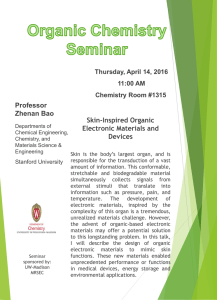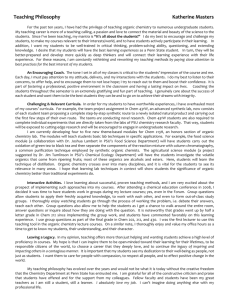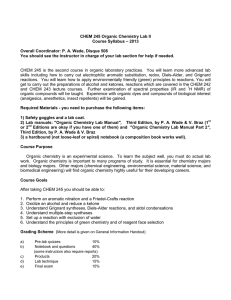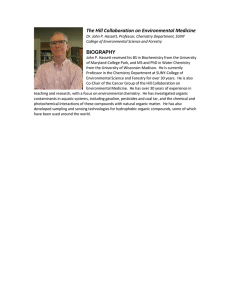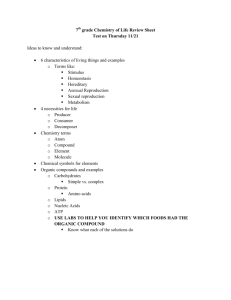Document 11139973
advertisement
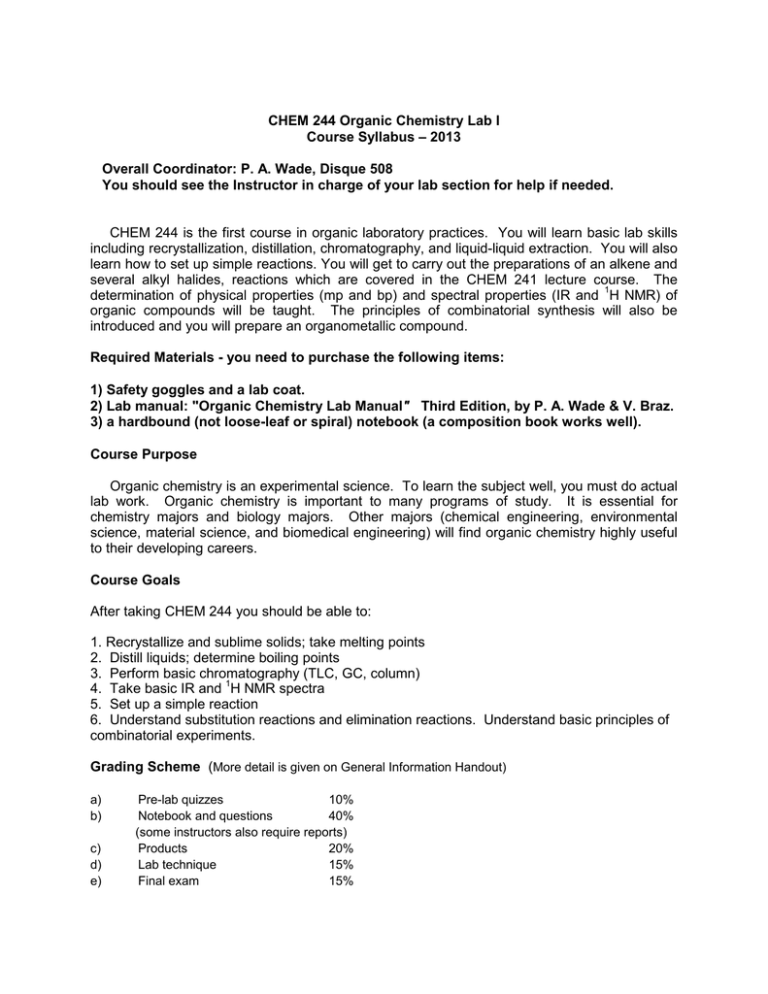
CHEM 244 Organic Chemistry Lab I Course Syllabus – 2013 Overall Coordinator: P. A. Wade, Disque 508 You should see the Instructor in charge of your lab section for help if needed. CHEM 244 is the first course in organic laboratory practices. You will learn basic lab skills including recrystallization, distillation, chromatography, and liquid-liquid extraction. You will also learn how to set up simple reactions. You will get to carry out the preparations of an alkene and several alkyl halides, reactions which are covered in the CHEM 241 lecture course. The 1 determination of physical properties (mp and bp) and spectral properties (IR and H NMR) of organic compounds will be taught. The principles of combinatorial synthesis will also be introduced and you will prepare an organometallic compound. Required Materials - you need to purchase the following items: 1) Safety goggles and a lab coat. 2) Lab manual: "Organic Chemistry Lab Manual" Third Edition, by P. A. Wade & V. Braz. 3) a hardbound (not loose-leaf or spiral) notebook (a composition book works well). Course Purpose Organic chemistry is an experimental science. To learn the subject well, you must do actual lab work. Organic chemistry is important to many programs of study. It is essential for chemistry majors and biology majors. Other majors (chemical engineering, environmental science, material science, and biomedical engineering) will find organic chemistry highly useful to their developing careers. Course Goals After taking CHEM 244 you should be able to: 1. Recrystallize and sublime solids; take melting points 2. Distill liquids; determine boiling points 3. Perform basic chromatography (TLC, GC, column) 1 4. Take basic IR and H NMR spectra 5. Set up a simple reaction 6. Understand substitution reactions and elimination reactions. Understand basic principles of combinatorial experiments. Grading Scheme (More detail is given on General Information Handout) a) b) c) d) e) Pre-lab quizzes 10% Notebook and questions 40% (some instructors also require reports) Products 20% Lab technique 15% Final exam 15% Projected List of Experiments Experiment 1. Purification of Solids – Recrystallization and Sublimation Experiment 2. Distillation Experiment 3. Extraction of Caffeine from Tea Experiment 4. Separation of a Mixture by Acid - Base Extractions Experiment 5. Chromatography Experiment 6. Steam Distillation of a Naphthalene / Salicylic Acid Mixture Experiment 7. Preparation of Alkyl Halides by the SN2 Reaction Experiment 8. Carbocations I. Preparation of t-Butyl Chloride from t-Butyl Alcohol Experiment 9. Carbocations II. Preparation of Cyclohexene from Cyclohexanol Experiment 10. Preparation of the Bromohydrin of 1-Methylcyclohexene Experiment 11. Combinatorial Synthesis of a Series of Carboxylic Esters Experiment 12. Synthesis of Ferrocene Academic Policies Plagiarism, cheating, fabrication and other acts of academic misconduct will not be tolerated. For more information, see material in “academic dishonesty” under the “academic policies” tab at the following link: http://drexel.edu/studentaffairs/community_standards/studentHandbook/ Students with disabilities should see material under the “health and disability services” tab at the following link: http://drexel.edu/studentaffairs/community_standards/studentHandbook/ If you are registered and wish to drop or withdraw from this course, see the following link: http://www.drexel.edu/provost/policies/course_drop.asp The list of experiments and/or individual portions of experiments may be modified after the term begins. If such changes are made, your lab Instructor will inform you during class.
